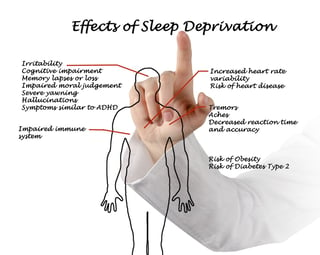 In recent years, the effects of sleep deprivation and its effects on EMS health and safety have come onto the radar. Depending on the area, it is not uncommon for EMS personnel to work 24-hour shifts. The responsibilities of EMS personnel require them to remain alert and attentive at all times in order to prevent procedural errors and avoid injury to themselves, co-workers, patients, and others. Studies show that consistently working long shifts causes fatigue, which makes even simple tasks become difficult, drug calculations more challenging, and the overall environment more unsafe.
In recent years, the effects of sleep deprivation and its effects on EMS health and safety have come onto the radar. Depending on the area, it is not uncommon for EMS personnel to work 24-hour shifts. The responsibilities of EMS personnel require them to remain alert and attentive at all times in order to prevent procedural errors and avoid injury to themselves, co-workers, patients, and others. Studies show that consistently working long shifts causes fatigue, which makes even simple tasks become difficult, drug calculations more challenging, and the overall environment more unsafe.
Sleep deprivation compromises brain and body systems, which prevent them from functioning properly and diminishing the quality of life. For their own health and safety, as well as the well-being of others, EMS professionals are required to be aware of the long-term effects of the lack of sleep and the effects of fatigue in the workplace.
Sleep Deprivation and Health
Just like the body needs air and food to function properly-- it also requires sleep. According to the Division of Sleep Medicine at Harvard Medical School, important restorative functions take place during the sleep state. When a person sleeps, the body performs tissue repair, muscle growth, and protein synthesis. EMS staff who consistently receive less than eight hours of sleep per night have an increased risk of succumbing to:
- Weight gain
- Diabetes
- Cardiovascular disease
- Hypertension
- Compromised immune system
- Common cold
During sleep, the body also rejuvenates the individual and helps them to recover from the wear and tear associated with their job and other aspects of day-to-day living.
Sleep Deprivation and Safety
Similar to the predicament of other sleep-deprived shift workers, the risk to EMS health and safety increases on the roadways and manifests in the form of driver impairment and motor vehicle crashes. According to the National Highway Traffic Safety Administration (NHTSA), drowsy drivers are involved in 100,000 collisions each year, which results in more than 1,500 deaths and 40,000 injuries. According to the NHTSA, 50 percent of EMS workers suffer from fatigue.
Sleep Deprivation and Performance
Often, EMS personnel must provide medication, lift patients, administer treatment or use certain medical equipment and devices, within a matter of minutes or seconds after coming into contact with a patient and making an assessment of the person and their condition. Studies show that poor sleep quality and consistent fatigue have a debilitating effect on the central nervous system, which can lead to:
- Impaired communication
- Reduced motivation
- Drowsiness
- Fatigue
- Decreased alertness
- Memory lapse
- Slowed reaction time
- Impaired thinking and judgment
All of the effects listed above reduce the productivity of EMS workers and can lead to motor function impairment, including trips and falls when moving a patient.
In particular, fatigue may contribute to muscle weakness which can affect the carrying capacity of the responder and the safety of the patient. The safety and well-being of patients can be better protected by moving them with a flexible stretcher, like the MegaMover® Transport Unit, until getting to the wheeled gurney and ambulance.
Sleep deprivation is just one of the health risk associated with EMS personnel. If you are interested in learning more, we invite you to read our eBook, Promoting EMS Staff Productivity: Addressing the Health and Wellness of First Responders. Graham Medical is dedicated to providing products that aid in promoting the safety and well-being of both patients and responders.

